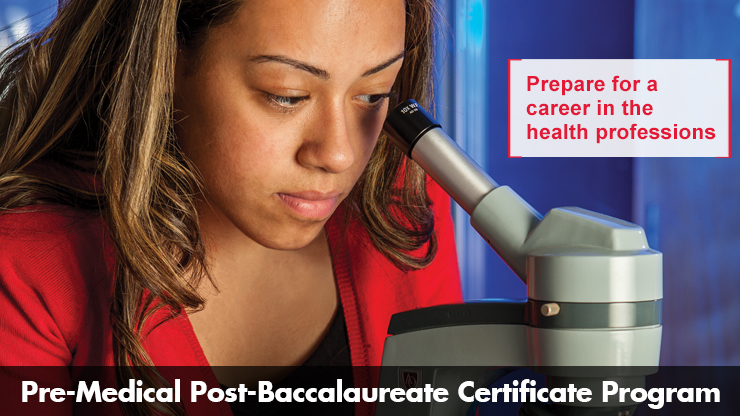Pre-Medical Post-Baccalaureate Program

Want to learn more?
Speak with a graduate admissions counselor
The Pre-Medical Post-Baccalaureate Certificate Program Offers:
- Personalized Advising
- Individualized Flexible Schedule
- Customized Pre-Medical Curriculum
- Pre-Health Committee Letter
- Health Professions Club
- Supportive Learning Community
- Application Workshops
- Health Professions File
- Certificate Option
The Caldwell University Pre-Medical Post-Baccalaureate Certificate Program provides individualized advising for post-baccalaureate students to broaden and enrich their academic preparation for application to medical and health professional schools in a supportive learning environment. Students receive a customized academic plan to meet their individual academic needs and timeline for program completion and application.
Apply
Online:
By Mail:
Supporting documents can be sent to mailing address below (i.e. transcripts and letters of recommendation):
Office of Undergraduate Admissions
Caldwell University
120 Bloomfield Avenue • Caldwell, NJ 07006
Request more information about the Pre-Medical Post-Baccalaureate Program.
William A. Velhagen, Jr., Ph. D.
Premedical Advisor and Associate Professor of Biology
Department of Natural and Physical Sciences
wvelhagen@caldwell.edu
Admissions Requirement
PRE-MEDICAL POST-BACCALAUREATE CERTIFICATE PROGRAM:
- Baccalaureate degree in any field from an accredited institution
- Official transcripts of all college work completed
- A written autobiographical statement explaining reason for applying to the program
- Personal interview with Program Director
- Admission is on a rolling basis in spring, summer, and fall semesters
- Letter of Recommendation from a former/current professor or supervisor speaking about your work ethic, character and wish to pursue a career in a health profession.
Financial Information
The cost of the Pre-Medical Post-Baccalaureate Certificate Program at Caldwell University depends on the number of credits completed.
TUITION
For the 2023-2024 academic year, the tuition per credit hour (subject to change) is:
- $1,245/credit (for undergraduate courses)
FINANCIAL AID
For financial aid options, call the Office of Financial Aid at 973-618-3221 or visit caldwell.edu/financial-aid.
Gainful Employment Disclosure
CALDWELL UNIVERSITY
Post baccalaureate certificate in Pre-Medical Post Baccalaureate Certificate Program
Program Length: 45 weeks
STUDENTS GRADUATING ON TIME
N/A* of Title IV students complete the program within 45 weeks*Fewer than 10 students enrolled in this program. This number has been withheld to preserve the confidentiality of the students.
PROGRAM COSTS*
$30,305 for tuition and fees$3,000 for books and supplies
OTHER COSTS
Visit website for more program cost information*The amounts shown above include costs for the entire program, assuming normal time to completion.
Note that this information is subject to change.
STUDENTS BORROWING MONEY
The typical graduate leaves with
N/A* in debt*Fewer than 10 students completed this program within normal time. This number has been withheld to preserve the confidentiality of the students.The typical monthly loan payment
N/A* per month in student loans with an interest rate of N/A*.*Fewer than 10 students completed this program within normal time. This number has been withheld to preserve the confidentiality of the students.
GRADUATES WHO GOT JOBS
N/A* of program graduates got jobs*We are not currently required to calculate a job placement rate for program completers.Program graduates are employed in the following fields:Dentists, GeneralFamily and General PractitionersPhysicians and Surgeons, All OtherPhysician AssistantsAnesthesiologist AssistantsPodiatristsMedical and Clinical Laboratory TechniciansDental AssistantsMedical Assistants
LICENSURE REQUIREMENTS
Program does not qualify students to sit for licensure exam in:Alabama, Alaska, American Samoa, Arizona, Arkansas, California, Colorado, Connecticut, Delaware, District of Columbia, Federated States of Micronesia, Florida, Georgia, Guam, Hawaii, Idaho, Illinois, Indiana, Iowa, Kansas, Kentucky, Louisiana, Maine, Marshall Islands, Maryland, Massachusetts, Michigan, Minnesota, Mississippi, Missouri, Montana, Nebraska, Nevada, New Hampshire, New Jersey, New Mexico, New York, North Carolina, North Dakota, Northern Marianas, Ohio, Oklahoma, Oregon, Palau, Pennsylvania, Puerto Rico, Rhode Island, South Carolina, South Dakota, Tennessee, Texas, Utah, Vermont, Virgin Islands, Virginia, Washington, West Virginia, Wisconsin, Wyoming
Additional InformationDate Created 4/26/2019These disclosures are required by the U.S. Department of Education

